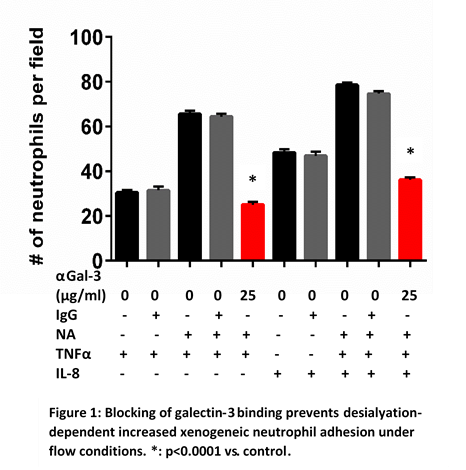Inhibition of Sialidase Activity and Galectin Binding Reduces Xenogeneic Neutrophil-Endothelial Adhesion
1Deparment of Surgery, Massachusetts General Hospital, Boston, MA, 2Department of Surgery, University of Maryland School of Medicine, Baltimore, MD, 3Department of Microbiology and Immunology, and Institute of Marine and Environmental Technology, University of Maryland School of Medicine, Baltimore, MD, 4Department of Medicine Center for Vaccine Development, University of Maryland School of Medicine, Baltimore, MD
Meeting: 2019 American Transplant Congress
Abstract number: D83
Keywords: Adhesion molecules, Leukocytes, Pig, Xenoreactive antibodies
Session Information
Session Name: Poster Session D: Xenotransplantation
Session Type: Poster Session
Date: Tuesday, June 4, 2019
Session Time: 6:00pm-7:00pm
 Presentation Time: 6:00pm-7:00pm
Presentation Time: 6:00pm-7:00pm
Location: Hall C & D
*Purpose: Immediate neutrophil sequestration occurs despite genetic modifications (Gal-a-1-3 galactosyl transferase knock out; human CD46 complement regulatory gene addition) to pig donor organs. Sialic acids regulate neutrophil adhesion and activation, modulating pro-inflammatory immunologic responses. Sialidase activity exposes galactose residues that can ligate galectins. Here we describe a role for inhibiting sialidases and galectins to modulate xenogeneic neutrophil adhesion.
*Methods: The adhesion of human neutrophils to GTKO.hCD46 pig aortic endothelial cells (pAECs) was measured in static and microfluidic flow chamber conditions (Bioflux, 1 dyne/cm2) in presence of various treatments.
*Results: Pretreatment of pAECs or calceinAM labelled neutrophils with Clostridium perfringens neuraminidase (NA, 25 mU/mL) increased adhesion under static conditions (36% with NA vs. 22%, p<0.0001). Neuraminidase inhibition decreased neutrophil adhesion under flow conditions: Treatment of pAECs with 2-deoxy-NANA (1 mM) nearly completely inhibited desialylation-dependent neutrophil adhesion, whereas pretreating neutrophils reduced adhesion by ~60%. Zanamivir (1 mM) reduced neutrophil adhesion by ~50% regardless of which cells were pretreated (p<0.0001 vs. control). N-acetyllactosamine, which inhibits galectin binding, decreased neutrophil adhesion to NA-pretreated pAECs (14% vs. 36%, p<0.0001). Incubating both pAECs and neutrophils with anti-human galectin-3 antibody completely abrogated NA-dependent adhesion to human tumor necrosis factor-treated (25 ng/mL) pAECs (NA/gal-3: 22% vs. NA: 66%, no NA: 30%, p<0.0001).
*Conclusions: Inhibiting sialidase (2-deoxy-NANA; zanamivir) or galectin (N-acetyllactosamine; anti-galectin-3) decreased human neutrophil adhesion to pAECs, demonstrating that inhibiting sialidase activity and galectin-binding are each likely to prevent neutrophil-mediated inflammation and tissue injury in xenogeneic models.
To cite this abstract in AMA style:
Cerel BM, French BM, Harris DG, Laird C, Burdorf L, Cheng X, Feng C, Cross AS, Goldblum SE, Vasta GR, III RNPierson, Azimzadeh AM. Inhibition of Sialidase Activity and Galectin Binding Reduces Xenogeneic Neutrophil-Endothelial Adhesion [abstract]. Am J Transplant. 2019; 19 (suppl 3). https://atcmeetingabstracts.com/abstract/inhibition-of-sialidase-activity-and-galectin-binding-reduces-xenogeneic-neutrophil-endothelial-adhesion/. Accessed March 4, 2026.« Back to 2019 American Transplant Congress

